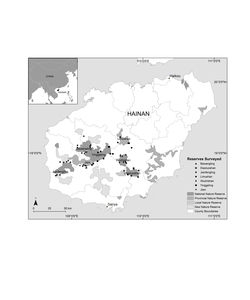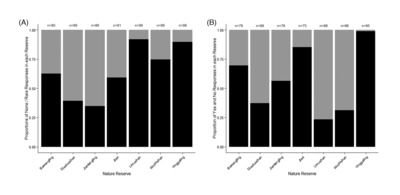Nash, HC;
Wong, MHG;
Turvey, ST;
(2016)
Using local ecological knowledge to determine status and threats of the Critically Endangered Chinese pangolin (Manis pentadactyla) in Hainan, China.
Biological Conservation
, 196
pp. 189-195.
10.1016/j.biocon.2016.02.025.

Preview |
Text
Turvey_Nash_et_al_pangolin_Biol_Cons_17Feb2016.pdf Download (642kB) | Preview |
![[thumbnail of Turvey_Nash_et_al_Fig_1.jpg]](https://discovery.ucl.ac.uk/1476620/28.hassmallThumbnailVersion/Turvey_Nash_et_al_Fig_1.jpg)  Preview |
Image
Turvey_Nash_et_al_Fig_1.jpg Download (3MB) | Preview |
![[thumbnail of Turvey_Nash_et_al_Fig_2.jpg]](https://discovery.ucl.ac.uk/1476620/29.hassmallThumbnailVersion/Turvey_Nash_et_al_Fig_2.jpg)  Preview |
Image
Turvey_Nash_et_al_Fig_2.jpg Download (187kB) | Preview |
Preview |
Text
Turvey_Nash_et_al_Highlights.pdf Download (117kB) | Preview |
Preview |
Text
Turvey_Nash_et_al_SI_English_questionnaire.pdf Download (282kB) | Preview |
Preview |
Text
Turvey_Nash_et_al_SI_Mandarin_questionnaire.pdf Download (339kB) | Preview |
Preview |
Text
Turvey_Nash_et_al_SI_last-sighting_data.pdf Download (347kB) | Preview |
Preview |
Text
Turvey_Nash_et_al_SI_tables.pdf Download (327kB) | Preview |
Abstract
The use of robust ecological data to make evidence-based management decisions for highly threatened species is often limited by data availability, and local ecological knowledge (LEK) is increasingly seen as an important source of information for conservation. Pangolins are now the most heavily trafficked mammals in illegal wildlife trade, and Chinese pangolins (Manis pentadactyla) are Critically Endangered, with no recent baseline data available to assess status of pangolin populations in China. We conducted community-based interviews across seven protected areas in Hainan, China, to investigate whether LEK can provide novel insights for pangolin conservation. LEK of pangolins remains high in Hainan (90% of respondents recognise pangolins and can provide supporting information), and pangolins are likely to survive in all protected areas that were surveyed, as evidenced by recent sightings dating from 2013-2015. However, all populations have declined and are now perceived to be of very low abundance (only 34% of respondents consider pangolins to remain locally present, and these respondents all regard pangolins as rare). Illegal hunting continues across this region, with pangolin body parts used locally and sold to outsiders. Pangolins are likely to soon become extirpated across Hainan unless effective conservation management plans can be initiated. Methods to monitor and assess pangolin status and threats are urgently required across all range states, and we demonstrate that large-scale LEK surveys can strengthen the evidence-base for informing robust conservation action and management plans for these species.
| Type: | Article |
|---|---|
| Title: | Using local ecological knowledge to determine status and threats of the Critically Endangered Chinese pangolin (Manis pentadactyla) in Hainan, China |
| Open access status: | An open access version is available from UCL Discovery |
| DOI: | 10.1016/j.biocon.2016.02.025 |
| Publisher version: | http://dx.doi.org/10.1016/j.biocon.2016.02.025 |
| Language: | English |
| Additional information: | © 2016. This manuscript version is published under a Creative Commons Attribution Non-commercial Non-derivative 4.0 International licence (CC BY-NC-ND 4.0). This licence allows you to share, copy, distribute and transmit the work for personal and non-commercial use providing author and publisher attribution is clearly stated. Further details about CC BY licences are available at http://creativecommons.org/licenses/by/4.0. |
| Keywords: | local ecological knowledge, pangolin, China, hunting, Manis pentadactyla |
| UCL classification: | UCL UCL > Provost and Vice Provost Offices UCL > Provost and Vice Provost Offices > School of Life and Medical Sciences UCL > Provost and Vice Provost Offices > School of Life and Medical Sciences > Faculty of Life Sciences UCL > Provost and Vice Provost Offices > School of Life and Medical Sciences > Faculty of Life Sciences > Div of Biosciences |
| URI: | https://discovery.ucl.ac.uk/id/eprint/1476620 |
Archive Staff Only
 |
View Item |


